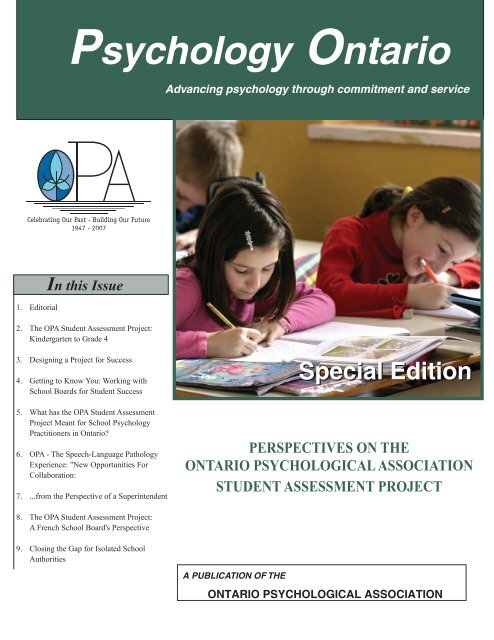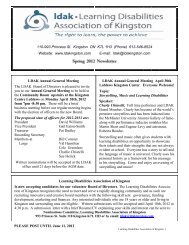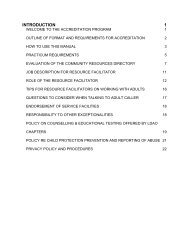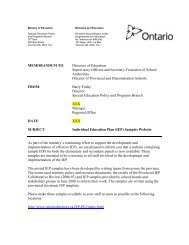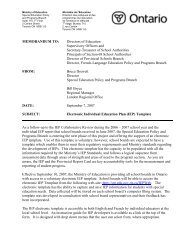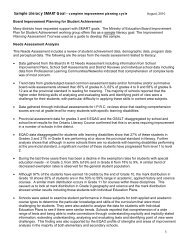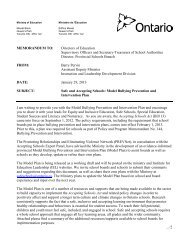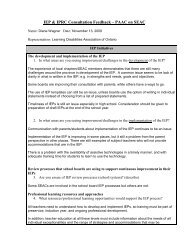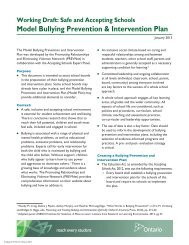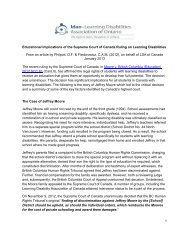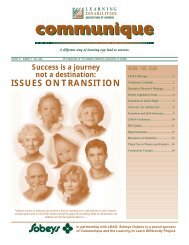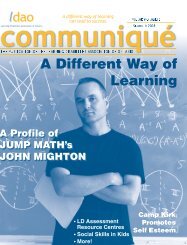Perspectives on the OPA Student Assessment Project - Learning ...
Perspectives on the OPA Student Assessment Project - Learning ...
Perspectives on the OPA Student Assessment Project - Learning ...
Create successful ePaper yourself
Turn your PDF publications into a flip-book with our unique Google optimized e-Paper software.
The Ministry PerspectiveThe <strong>OPA</strong> <strong>Student</strong> <strong>Assessment</strong> <strong>Project</strong>:Kindergarten to Grade 4OntarioRobert Spall, Educati<strong>on</strong> OfficerBruce Drewett, DirectorSpecial Educati<strong>on</strong> Policy and Programs BranchMinistry of Educati<strong>on</strong>“Coming toge<strong>the</strong>r is a beginning, staying toge<strong>the</strong>r isprogress, and working toge<strong>the</strong>r is success.”The above quote by Vesta Kelly aptly describes whatwe, at <strong>the</strong> ministry, have experienced while workingwith <strong>the</strong> Ontario Psychological Associati<strong>on</strong> (<strong>OPA</strong>) andits <strong>Student</strong> <strong>Assessment</strong> <strong>Project</strong>.In <strong>the</strong> spring of 2006, <strong>the</strong> Ontario governmentannounced funding to school boards to supportassessments for students who require special educati<strong>on</strong>programs and/or services. This was a comp<strong>on</strong>ent of<strong>the</strong> early identificati<strong>on</strong> and interventi<strong>on</strong> initiatives thatsupport <strong>the</strong> Ministry of Educati<strong>on</strong>’s strategic directi<strong>on</strong>.A core committee of <strong>OPA</strong> members was created tomanage <strong>the</strong> project and ensure that its objectives wereattainable and <strong>on</strong> track. It was decided that <strong>the</strong>re neededto be an <strong>on</strong>going relati<strong>on</strong>ship with staff from <strong>the</strong> SpecialEducati<strong>on</strong> Policy and Programs Branch of <strong>the</strong> Ministryof Educati<strong>on</strong>. Al<strong>on</strong>g with <strong>the</strong> executive director,president of <strong>the</strong> <strong>OPA</strong> and chief psychologists from anumber of school boards, ministry staff were asked tobe part of this committee. Later <strong>the</strong> committee expandedto include <strong>the</strong> newly hired project manager and afrancoph<strong>on</strong>e psychologist from a school board.This committee developed <strong>the</strong> four objectives for <strong>the</strong>project. There was <strong>on</strong>going discussi<strong>on</strong> between <strong>the</strong><strong>OPA</strong> and <strong>the</strong> ministry as <strong>the</strong>se objectives evolved.Every<strong>on</strong>e at <strong>the</strong> table learned to understand and respecteach o<strong>the</strong>r’s perspective and to find ways to make thiscollaborative process work.work. A sec<strong>on</strong>d team was formed. A provincial advisorycommittee was established to represent psychology,occupati<strong>on</strong>al <strong>the</strong>rapy and speech/language pathology, aswell as <strong>the</strong> perspective of educators from school boards.The <strong>OPA</strong> chose to invite ministry staff to this committeetable to provide English and French-language specialeducati<strong>on</strong> policy perspectives.This committee proved to be incredibly helpful to <strong>the</strong>evoluti<strong>on</strong> of <strong>the</strong> project as it provided an informedsounding board for <strong>the</strong> project plans. As this workprogressed, <strong>the</strong> objectives grew, changed and evolved.After a final versi<strong>on</strong> of <strong>the</strong> project plan was approved by<strong>the</strong> core committee, it was time to promote <strong>the</strong> project to<strong>the</strong> school boards.Each school board was asked to name an <strong>OPA</strong> projectteam and <strong>the</strong> <strong>OPA</strong> assigned a m<strong>on</strong>itor/coach to supportthis team. The ministry has been fully involved in thiscrucial, hands-<strong>on</strong> comp<strong>on</strong>ent, including supporting <strong>the</strong>development of school board project plans and m<strong>on</strong>itoring<strong>the</strong>ir progress in achieving <strong>the</strong> four project objectives.There was no obligati<strong>on</strong> for <strong>the</strong> <strong>OPA</strong> to involve <strong>the</strong>ministry in all aspects of <strong>the</strong> project as it chose to do. Theexecutive director, <strong>the</strong> president and <strong>the</strong> project managerview this project as a partnership between <strong>the</strong> ministryand <strong>the</strong> associati<strong>on</strong>. There is a deep sense of resp<strong>on</strong>sibilityto provide <strong>the</strong> ministry with results that are accountable,support student achievement, and show improvement inassessment processes in school boards across <strong>the</strong> provincethat are sustainable.It became clear to <strong>the</strong> <strong>OPA</strong> that a broader provincialperspective would be helpful to inform <strong>the</strong> committee’sPsychology Ontario 3
The ministry has some specific outcomes that it wants to see as a result of thisproject. These outcomes centre <strong>on</strong> <strong>the</strong> classroom teacher providing effectiveinstructi<strong>on</strong> based <strong>on</strong> assessment informati<strong>on</strong>. This includes a better abilityof <strong>the</strong> teacher to assess students in <strong>the</strong> classroom, as well as to better use,through program design and delivery, assessment informati<strong>on</strong> provided throughprofessi<strong>on</strong>al assessments.To achieve <strong>the</strong>se goals <strong>the</strong> project needs to address <strong>the</strong> whole assessment processin school boards. This would include teacher educati<strong>on</strong>al assessments and<strong>the</strong> referral and follow-up processes for professi<strong>on</strong>al assessment reports. Finally, <strong>the</strong> project needs to support <strong>the</strong>development of <strong>the</strong> Individual Educati<strong>on</strong> Plan (IEP). These objectives were directly based <strong>on</strong> <strong>the</strong> recommendati<strong>on</strong>sregarding assessment in Educati<strong>on</strong> For All: The Report of <strong>the</strong> Expert Panel <strong>on</strong> Literacy and Numeracy for <strong>Student</strong>sWith Special Educati<strong>on</strong> Needs, Kindergarten to Grade 6. The <strong>OPA</strong> has built a project model that is in sync with <strong>the</strong>sedesired outcomes.One indirect result is <strong>the</strong> project has brought <strong>the</strong> working relati<strong>on</strong>ship between curriculum and special educati<strong>on</strong>departments closer toge<strong>the</strong>r in many school boards. This is a very desirable development to enhance learning for allstudents.Since <strong>the</strong> moment when <strong>the</strong> project was first announced, a sense of comm<strong>on</strong>purpose and commitment emerged. A workingteam that operates <strong>on</strong> mutual trust and respect is inplace. This team has built and will sustain a positiverelati<strong>on</strong>ship between <strong>the</strong> <strong>OPA</strong> and <strong>the</strong> ministry l<strong>on</strong>gafter <strong>the</strong> end date of <strong>the</strong> project passes.Designing a <strong>Project</strong> for SuccessMarg Peppler, <strong>Project</strong> Manager<strong>OPA</strong> <strong>Student</strong> <strong>Assessment</strong> <strong>Project</strong>I have spent most of my career working <strong>on</strong> project teams and managing projects in highly technical envir<strong>on</strong>ments. Istarted out at Ontario Hydro in cost engineering and scheduling during <strong>the</strong> c<strong>on</strong>structi<strong>on</strong> of <strong>the</strong> Bruce Nuclear PowerDevelopment. Over <strong>the</strong> years, my experience included projects in industrial marketing, business and strategicplanning, process re-engineering and customer service. I became <strong>the</strong> Manager of Customer Policies and Programsfor <strong>the</strong> transmissi<strong>on</strong> / distributi<strong>on</strong> divisi<strong>on</strong>, and eventually left <strong>the</strong> electricity business to pursue my c<strong>on</strong>sulting career.The next few years were spent working for <strong>the</strong> Ontario Government <strong>on</strong> informati<strong>on</strong> technology transiti<strong>on</strong> and o<strong>the</strong>rIT projects.In September 2006, I received a call that was to open <strong>the</strong> door to a whole new area of project management. I wasoffered <strong>the</strong> positi<strong>on</strong> of working with <strong>the</strong> Ontario Psychological Associati<strong>on</strong> (<strong>OPA</strong>) and <strong>the</strong> Ontario school boards asleader of <strong>the</strong> <strong>OPA</strong> <strong>Student</strong> <strong>Assessment</strong> <strong>Project</strong>. The Ministry of Educati<strong>on</strong> had provided <strong>the</strong> <strong>OPA</strong> with $20 milli<strong>on</strong>to support school boards to reduce <strong>the</strong> current waiting times for students requiring assessments and to enhanceteacher capacity. I was both uneasy and delighted with this new opportunity and change in my career directi<strong>on</strong>. But<strong>the</strong>n, project management is always about change. With my recently acquired <strong>Project</strong> Management Professi<strong>on</strong>alcredentials, and <strong>the</strong> excitement about helping young students to learn, I couldn’t wait to get started.4 Psychology Ontario
Setting <strong>the</strong> Directi<strong>on</strong>According to <strong>the</strong> PMBOK Guide 1 , a project is “a temporary endeavorundertaken to create a unique product, service or result.” By <strong>the</strong> time Iwas hired, <strong>the</strong> Ministry of Educati<strong>on</strong> and <strong>the</strong> <strong>OPA</strong> had already definedat a high level <strong>the</strong> unique results <strong>the</strong>y wanted to accomplish. Keyoutcomes identified in early communicati<strong>on</strong>s from <strong>the</strong> Ministry ofEducati<strong>on</strong> and <strong>the</strong> <strong>OPA</strong> to school boards included: reduce wait timesfor professi<strong>on</strong>al assessments 2 for JK to grade 4 students; enhanceteacher capacity; and help students to succeed. I knew from experiencethat clear directi<strong>on</strong> would be crucial, and that <strong>the</strong> best way to developthat clarity would be to c<strong>on</strong>sult with <strong>the</strong> project stakeholders – thosewho have a “stake” in <strong>the</strong> outcome of <strong>the</strong> project. The <strong>OPA</strong> had already set up a solid governance structure to makedecisi<strong>on</strong>s, manage and advise <strong>the</strong> project. My first order of business was to facilitate a workshop with <strong>the</strong> project’sAdvisory Group and listen carefully to what <strong>the</strong>y had to say.The Advisory Group included representatives from schoolboard psychology, speech language pathology, occupati<strong>on</strong>al<strong>the</strong>rapy, <strong>the</strong> Ministry of Educati<strong>on</strong>, and <strong>the</strong> <strong>OPA</strong> Boardof Directors. I was impressed with <strong>the</strong> enthusiasm andinsights of <strong>the</strong> group as <strong>the</strong> expectati<strong>on</strong>s, c<strong>on</strong>cerns andhigh hopes for <strong>the</strong> future were expressed at that first halfdaymeeting. When it was over, we all understood for<strong>the</strong> first time that <strong>the</strong> project was not just about doingprofessi<strong>on</strong>al assessments. It was about making changes to<strong>the</strong> assessment process, starting with <strong>the</strong> process of decidingwhich students would benefit from a professi<strong>on</strong>al assessment, <strong>the</strong>n assessing <strong>the</strong> student, next supporting teachersin implementing assessment recommendati<strong>on</strong>s, <strong>the</strong>n evaluating <strong>the</strong> impact of interventi<strong>on</strong>s <strong>on</strong> student success, andmaking assessment process changes based <strong>on</strong> less<strong>on</strong>s learned.Working with <strong>OPA</strong>’s decisi<strong>on</strong>-making committee and <strong>the</strong> Ministry of Educati<strong>on</strong>, four project objectives were created:1. reduce wait times for students in junior kindergarten to grade IV requiring professi<strong>on</strong>al assessments2. enhance teacher capacity to provide effective programming for students provided with professi<strong>on</strong>al assessments3. improve literacy / numeracy for students provided with professi<strong>on</strong>al assessments4. sustain assessment process improvements for <strong>the</strong> l<strong>on</strong>g termTo fur<strong>the</strong>r elaborate <strong>on</strong> our directi<strong>on</strong>, I worked with <strong>the</strong> stakeholders to expand and clarify our visi<strong>on</strong> of <strong>the</strong> successfulachievement of <strong>the</strong> four objectives, and to define how we would measure success.Planning Our ApproachNow that I knew where we were headed, my thoughts turned to implementati<strong>on</strong>. How was I going to work with sucha diverse group of school boards to achieve <strong>the</strong>se objectives? I was fortunate in that <strong>the</strong> Council of Ontario Directorsof Educati<strong>on</strong> 3 special educati<strong>on</strong> projects had been launched <strong>the</strong> previous year. With much appreciated advice andguidance from Frank Kelly, <strong>the</strong> Executive Director of CODE, and project lead,Michelle Forge, I was able to scope out a basic approach to working with schoolboards.Ano<strong>the</strong>r serious order of business was to determine a fair way to divide up <strong>the</strong> $20milli<strong>on</strong> grant am<strong>on</strong>g <strong>the</strong> 72 school boards and 3 school authority groups with <strong>the</strong>irwide variati<strong>on</strong> in enrollment, geographic locati<strong>on</strong>, and language. We ran many<strong>Project</strong> Governance<strong>OPA</strong>Board ofDirectorsCore Committee<strong>Project</strong> Manager &TeamAdvisory GroupAccountablefor <strong>the</strong><strong>Project</strong>Decisi<strong>on</strong> Makers <strong>on</strong> Behalfof <strong>the</strong> <strong>OPA</strong> Board ofDirectorsResp<strong>on</strong>sible to CoreCommittee for Planning,Executi<strong>on</strong>, C<strong>on</strong>trol, ClosureInform <strong>the</strong> Decisi<strong>on</strong>sof <strong>the</strong> <strong>Project</strong> Managerand TeamPsychology Ontario 5
Getting to Know You:Working with School Boards for<strong>Student</strong> SuccessBeverley Terrell-Deutsch, Ph.D., C. Psych.,M<strong>on</strong>itoring Lead,<strong>OPA</strong> <strong>Student</strong> <strong>Assessment</strong> <strong>Project</strong>Almost exactly <strong>on</strong>e year ago today I heard from Marg Peppler, <strong>the</strong> <strong>Project</strong> Manager, that I was being offered <strong>the</strong> positi<strong>on</strong>of M<strong>on</strong>itoring Lead for <strong>the</strong> <strong>OPA</strong> <strong>Student</strong> <strong>Assessment</strong> <strong>Project</strong>. I was excited and pleased, but truth be told, was also a littleanxious about what I had gotten myself into. How exactly had all this happened? I wasn’t even looking for a part-time job,and working <strong>on</strong> a school board project was not how I had envisi<strong>on</strong>ed spending my next two years. Why <strong>the</strong>n had I agreedto attend <strong>the</strong> job interview in <strong>the</strong> first place? Good questi<strong>on</strong>. Simple answer … when Marg had first called and described <strong>the</strong>project to me, it sounded intriguing. Imagine - having an opportunity to support school boards across Ontario in enhancing<strong>the</strong>ir educati<strong>on</strong>al and professi<strong>on</strong>al assessment processes for young students with learning needs!“… and <strong>the</strong> over-arching objective of <strong>the</strong> project?” I had asked.“<strong>Student</strong> success,” she answered.Who could turn down such an amazing opportunity? With $20 milli<strong>on</strong> in <strong>the</strong> bank waiting to be spent <strong>on</strong> assessment andcapacity building services for Junior Kindergarten to Grade 4 students, I was hooked.Early <strong>Learning</strong>I have learned so much in <strong>the</strong> past twelve m<strong>on</strong>ths. Having grown up, lived and worked my whole life in <strong>the</strong> Barrie and Tor<strong>on</strong>toareas (working for <strong>the</strong> Simcoe County Board of Educati<strong>on</strong> as an elementary teacher and <strong>the</strong>n in <strong>the</strong> Peel District SchoolBoard, first as a Psychoeducati<strong>on</strong>al C<strong>on</strong>sultant and later as <strong>the</strong> Chief Psychologist), I had little idea what was happening inschool boards in o<strong>the</strong>r parts of Ontario. I didn’t even know what a Ministry of Educati<strong>on</strong> Regi<strong>on</strong>al Office (aka RO) was… <strong>the</strong>re are six of <strong>the</strong>m, you know … L<strong>on</strong>d<strong>on</strong>, Greater Tor<strong>on</strong>to, Barrie, Ottawa, North Bay / Sudbury and Thunder Bay…<strong>the</strong> ROs are <strong>the</strong> administrative centres for all of <strong>the</strong> school boards within designated geographic areas. I also learned aboutEOs … Educati<strong>on</strong> Officers … many of <strong>the</strong>se individuals work in <strong>the</strong> Regi<strong>on</strong>al Offices where <strong>the</strong>y have supervisory andadministrative resp<strong>on</strong>sibilities. EOs work in <strong>the</strong> ROs … see, it’s easy. I also did not know that <strong>the</strong>re are 72 school boardsin Ontario and many tiny School Authorities, which are often a “single school” school board located in remote regi<strong>on</strong>s ofnor<strong>the</strong>rn Ontario.One of <strong>the</strong> first things I was to learn as a new member of <strong>the</strong> <strong>OPA</strong> project team was who else was <strong>on</strong> <strong>the</strong> team with me. Marg,our leader, (of course); <strong>the</strong>n Ed Blackstock with whom I had worked for many years in Peel when he was Chief Psychologistand I was working in <strong>the</strong> field; Énide Ém<strong>on</strong>d, our French language member, a former School Board Superintendent and8 Psychology Ontario
Educati<strong>on</strong> Officer; and Bob Spall, alsoan Educati<strong>on</strong> Officer with <strong>the</strong> Ministryof Educati<strong>on</strong> who has many years ofschool board experience in <strong>the</strong> area ofspecial educati<strong>on</strong>.That’s it - five of us, each, as part of ourjob, serving as “coach” for a dozen ormore school boards. As coaches, wehave been available to our school boardsshould <strong>the</strong>y have questi<strong>on</strong>s or c<strong>on</strong>cernsabout any of <strong>the</strong> project requirements orprocedures. The <strong>OPA</strong> project has a “100%success policy.” Part of <strong>the</strong> coach’s jobis to support, encourage and ensure <strong>the</strong>success of each of <strong>the</strong>ir school boards.Resp<strong>on</strong>sibilities of <strong>the</strong> M<strong>on</strong>itoringLeadAs might be expected early <strong>on</strong> with anyproject, <strong>the</strong>re are many questi<strong>on</strong>s thatcan arise for stakeholders, (i.e., thosewho have a “stake,” or vested interest, in<strong>the</strong> outcome of <strong>the</strong> project). One of <strong>the</strong>first major resp<strong>on</strong>sibilities I undertook asM<strong>on</strong>itoring Lead was to write <strong>the</strong> “<strong>OPA</strong><strong>Student</strong> <strong>Assessment</strong> <strong>Project</strong> Questi<strong>on</strong>sand Answers” document. This was madeavailable to school boards to assist withboth general and also more detailed /specific types of questi<strong>on</strong>s having to dowith any aspect of <strong>the</strong> project.In November 2006, a template askingschool boards to describe <strong>the</strong>ir“<strong>Assessment</strong> Capacity Building Plan”(ACBP) was sent out, to be completedand returned to <strong>the</strong> <strong>OPA</strong> in January2007. Am<strong>on</strong>g o<strong>the</strong>r things, in thistemplate school boards were askedto describe how <strong>the</strong>y planned to: (a)identify students targeted for professi<strong>on</strong>alassessments, (b) enhance <strong>the</strong> educati<strong>on</strong>alassessment process (i.e., assessmentsto be completed by teachers prior to areferral being made for a professi<strong>on</strong>alassessment) 1 , (c) support teachers inimplementing recommendati<strong>on</strong>s madein professi<strong>on</strong>al assessment reports, and(d) sustain process improvements for <strong>the</strong>l<strong>on</strong>g term.For six weeks in April and May lastspring, it was my job, as M<strong>on</strong>itoringLead, to travel across Ontario and meetwith members of each school board’s<strong>OPA</strong> project team and <strong>the</strong> regi<strong>on</strong>’sEducati<strong>on</strong> Officer 2 to discuss howschool boards were progressing with<strong>the</strong>ir ACBPlans. The <strong>OPA</strong> project coachresp<strong>on</strong>sible for that regi<strong>on</strong>’s schoolboards also traveled with me, so that<strong>the</strong>re were two of us to engage in mostof <strong>the</strong>se meetings. We were <strong>the</strong>re not<strong>on</strong>ly to discuss <strong>the</strong> school board’s currentsuccesses and challenges, <strong>the</strong>ir visi<strong>on</strong>sof what future success would look like,<strong>the</strong>ir emerging promising practices, andto see how <strong>the</strong>y were progressing againsteach of <strong>the</strong> four project objectives 3 , butalso to answer questi<strong>on</strong>s or deal withany c<strong>on</strong>cerns that school boards mighthave. In additi<strong>on</strong>, we took opportunities,as <strong>the</strong>y became available, to share ideasthat we had gleaned from <strong>on</strong>e schoolboard with ano<strong>the</strong>r that was in a similarsituati<strong>on</strong>.What a fulfilling, rewarding experience<strong>the</strong> m<strong>on</strong>itoring was! Without excepti<strong>on</strong>,<strong>the</strong> process was profoundly positive.School boards came in to <strong>the</strong> meetingswith enthusiasm and energy and suchgratitude for this m<strong>on</strong>ey that wasreserved for special educati<strong>on</strong> purposes.Many times we heard that schoolboards had seen <strong>the</strong> need for changesin <strong>the</strong>ir assessment processes, but with<strong>the</strong> funding this project provided, <strong>the</strong>yfound <strong>the</strong>y now had <strong>the</strong> additi<strong>on</strong>alresources to do something about it.We heard about many of <strong>the</strong> stressorsfacing school boards, from decliningenrolment, to staffing shortages, to hiringdifficulties, to ec<strong>on</strong>omic and financialfears, to travel times taking l<strong>on</strong>ger thanmeeting times, to high needs studentswith few community supports availablefor families, to transient populati<strong>on</strong>swith staggering turnover figures … <strong>the</strong>list goes <strong>on</strong>.But despite <strong>the</strong> many challenges thatwere described for us, we were struckby <strong>the</strong> creativity and thoughtfulness of<strong>the</strong> plans that school boards broughtforward to deal with <strong>the</strong> difficulties. Wewere amazed at <strong>the</strong> energy, dedicati<strong>on</strong>and hard work of <strong>the</strong>se people, most of<strong>the</strong>m putting in hours for this project <strong>on</strong>top of already overloaded full time jobsand many working c<strong>on</strong>currently <strong>on</strong> thisproject and several o<strong>the</strong>rs.Also gratifying was finally meeting <strong>the</strong>“pers<strong>on</strong> attached to <strong>the</strong> voice.” We, ascoaches, had been communicating withschool board <strong>OPA</strong> team members forseveral m<strong>on</strong>ths <strong>on</strong> <strong>the</strong> teleph<strong>on</strong>e and viaemail, and now we finally got to meet <strong>the</strong>min pers<strong>on</strong>. It was like seeing old friends.The m<strong>on</strong>itoring meetings made us allrealize just how pers<strong>on</strong>al <strong>the</strong> relati<strong>on</strong>shipswith school board team members hadbecome, and how important it is to buildtrust and real team relati<strong>on</strong>ships with ourschool board partners.One of <strong>the</strong> resp<strong>on</strong>sibilities of <strong>the</strong>M<strong>on</strong>itoring Lead was to write a reportthat would summarize <strong>the</strong> data ga<strong>the</strong>red in<strong>the</strong> m<strong>on</strong>itoring meetings in a format thatwould be both accessible and meaningfulto school boards, but not unwieldy interms of length. A report entitled “Statusof School Board <strong>Assessment</strong> CapacityBuilding: Summary of School BoardM<strong>on</strong>itoring Resp<strong>on</strong>ses: Provincial ViewApril - May 2007,” was produced andplaced <strong>on</strong> <strong>the</strong> <strong>OPA</strong> website. 4 This reportis an overall, provincial view of <strong>the</strong> resultsof <strong>the</strong> m<strong>on</strong>itoring meetings and wasintended to be helpful to school boardsin moving forward with <strong>the</strong>ir <strong>Assessment</strong>Capacity Building Plans. Also producedand placed <strong>on</strong> <strong>the</strong> <strong>OPA</strong> website were“segment reports” (i.e., small, medium,large, very large, French language, orNor<strong>the</strong>rn school boards) where schoolboards could see what o<strong>the</strong>r similarschool boards had described during <strong>the</strong>m<strong>on</strong>itoring meetings.Psychology Ontario 9
Moving ForwardSince <strong>the</strong> m<strong>on</strong>itoring meetings last spring, each of us <strong>on</strong> <strong>the</strong> <strong>OPA</strong>project team in our coaching role has worked with our school boardsas <strong>the</strong>y prepared and submitted <strong>the</strong>ir June Reports, and as <strong>the</strong>y morerecently prepared and submitted <strong>the</strong>ir updated <strong>Assessment</strong> CapacityBuilding Plans.The m<strong>on</strong>itoring process this year will be different from that of lastyear. Ra<strong>the</strong>r than face-to-face m<strong>on</strong>itoring meetings in <strong>the</strong> spring,school boards have just recently received a template from our teamoutlining <strong>the</strong> key results areas that <strong>the</strong>y will be asked to report <strong>on</strong> andreturn to <strong>the</strong> <strong>OPA</strong> in May 2008. We coaches will be speaking withour school board colleagues around <strong>the</strong> reporting requirements tomeasure project success, offering suggesti<strong>on</strong>s, answering questi<strong>on</strong>s,c<strong>on</strong>tinuing in our role as we help to ensure <strong>the</strong> success of everyschool board.SuccessIn this respect, my job as M<strong>on</strong>itoring Lead and as an <strong>OPA</strong> team coach, al<strong>on</strong>g with my four team member colleagues,isn’t very different from that of all <strong>the</strong> teachers, administrators, special educati<strong>on</strong> resource staff, professi<strong>on</strong>alservices staff, and all those o<strong>the</strong>r individuals who work so diligently in schools to promote student success.Success. It’s what every<strong>on</strong>e wants. It’s what every<strong>on</strong>e needs. Despite all of <strong>the</strong> challenges facing school boardstoday, this project has shown us that positive changes supporting student success are not <strong>on</strong>ly possible, but alreadyhappening.(Footnotes)1Professi<strong>on</strong>al assessments include psychology, speech language pathology and occupati<strong>on</strong>al <strong>the</strong>rapy assessments.2The Educati<strong>on</strong> Officers across Ontario had generously assisted us with <strong>the</strong> many complexities in arranging all<strong>the</strong>se m<strong>on</strong>itoring meetings and also attended <strong>the</strong> meetings with us. Our friend and colleague in Thunder Bay,Bob Greer, actually drove us from school board to school board, making sure we had good food and w<strong>on</strong>derfulnor<strong>the</strong>rn photo and shopping opportunities al<strong>on</strong>g <strong>the</strong> way.3The four project objectives are:(1) reduce wait times for students in Junior Kindergarten to Grade 4 requiring professi<strong>on</strong>al assessments,(2) enhance teacher capacity to provide effective programming for students provided with professi<strong>on</strong>alassessments,(3) improve literacy / numeracy for students provided with professi<strong>on</strong>al assessments, and(4) sustain assessment process improvements for <strong>the</strong> l<strong>on</strong>g term.4www.psych.<strong>on</strong>.ca10 Psychology Ontario
What has <strong>the</strong> <strong>OPA</strong> <strong>Student</strong> <strong>Assessment</strong><strong>Project</strong> Meant for School PsychologyPractiti<strong>on</strong>ers in Ontario?Dr. Ian BrownChief Psychologist, Durham CatholicDistrict School BoardPresident, Associati<strong>on</strong> of ChiefPsychologists with Ontario SchoolThe following is a descripti<strong>on</strong> of some of <strong>the</strong> ways in which <strong>the</strong> <strong>Student</strong> <strong>Assessment</strong> <strong>Project</strong> has been beneficialfor school board psychology practiti<strong>on</strong>ers. I am grateful to my fellow Chiefs for <strong>the</strong>ir comments whichc<strong>on</strong>stitute <strong>the</strong> bulk of this article.1. Expanded role:This <strong>Project</strong> has raised <strong>the</strong> profile of psychological servicesstaff within school boards, (and in a more positive way thandid <strong>the</strong> ISA process of previous years). That is, it has helpedpsychologists to be fur<strong>the</strong>r recognized as collaborativeand supportive of teachers’ efforts in <strong>the</strong> classroom. Weare seen as able to do much more than merely assessingstudents’ spelling or reading skills; that is, <strong>the</strong> percepti<strong>on</strong>of <strong>the</strong> role has expanded from that of “assessment jockey”to collaborative partner and c<strong>on</strong>sultant in realms of, andbey<strong>on</strong>d, psychometric assessment, including mentalhealth, autism, developmental disabilities, and a host ofo<strong>the</strong>r areas of student difficulty. In some boards, in fact,<strong>the</strong> number of referrals for psychological assessments hasdecreased, while <strong>the</strong>re has been an increase in referrals foro<strong>the</strong>r services and supports. Psychological services staffare included <strong>on</strong> Board teams that address <strong>the</strong>se issues.2. Increased staffing:The <strong>Project</strong> has in many cases provided for <strong>the</strong> hiring ofadditi<strong>on</strong>al staff (psychologists, psychological associates,and psychometrists), where it was possible to successfullyrecruit qualified individuals. Some boards have found itdifficult to recruit staff, due to <strong>the</strong> significant shortage ofqualified school psychology pers<strong>on</strong>nel in <strong>the</strong> province,a c<strong>on</strong>diti<strong>on</strong> which will be exacerbated when a numberof us retire in <strong>the</strong> next few years. This <strong>Project</strong> hasprovided opportunities for new graduates, those undersupervised practice, and doctoral interns, as well as someveterans who came to <strong>the</strong> Nirvana of school boards fromo<strong>the</strong>r areas of psychological practice. Some Boards arec<strong>on</strong>tracting out assessments to private practiti<strong>on</strong>ers soregular board staff can be more involved with follow upof recommendati<strong>on</strong>s in <strong>the</strong> classroom, while ano<strong>the</strong>r isworking with universities to recruit, train, and eventuallyhire additi<strong>on</strong>al staff.3. Wait lists and wait times:For <strong>the</strong> school boards where students were waiting a l<strong>on</strong>gtime for psychological assessments, <strong>the</strong> waiting time hasbeen reduced. Similarly, <strong>the</strong> list of students waiting for apsychological assessment has decreased. A significant number(in <strong>the</strong> thousands) of additi<strong>on</strong>al professi<strong>on</strong>al assessments ofstudents in JK to Grade Four, which would o<strong>the</strong>rwise not havebeen completed, will be, as a result of this <strong>Project</strong>, to <strong>the</strong> benefitof those students, <strong>the</strong>ir teachers, and <strong>the</strong>ir parents.4. Pre-referral process:Many Boards have improved <strong>the</strong>ir pre-referral procedures,including <strong>the</strong> adopti<strong>on</strong> of pre-assessment screening practices,and engaging classroom teachers in all steps of <strong>the</strong> process.A tiered approach that emphasizes c<strong>on</strong>sultati<strong>on</strong> with teachingstaff before making referrals for professi<strong>on</strong>al assessments isin place in some Boards. O<strong>the</strong>rs have made improvements in<strong>the</strong>ir referral forms and school support team processes, andincreased face-to-face c<strong>on</strong>versati<strong>on</strong> with classroom teachersduring <strong>the</strong> course of <strong>the</strong> assessment process about needsfor programming purposes. Psychology staff have assistedschool-based teams in problem-solving for students whoare encountering significant difficulties; <strong>the</strong> discussi<strong>on</strong>s arefocused and productive.5. <strong>Assessment</strong> practices:Some Boards have adopted a universal screening processto identify SK and Grade One students at risk for readingproblems. These children receive a battery of readingrelated processing tests (ph<strong>on</strong>emic awareness, memory, etc.).Results are shared with <strong>the</strong> classroom teacher and a readingteam at <strong>the</strong> schools; advice is provided <strong>on</strong> differentiatedPsychology Ontario 11
<strong>OPA</strong> – The Speech-LanguagePathology Experience: " NewOpportunities for Collaborati<strong>on</strong>"Susan Menary, M.Sc, Reg. CASLPOChief Speech-Language PathologistAutism LeadTor<strong>on</strong>to Catholic District School BoardThe <strong>OPA</strong> project underway in school boards across Ontario has provided new opportunities for collaborati<strong>on</strong> andinnovati<strong>on</strong> am<strong>on</strong>g Psychology staff, Speech-Language Pathologists (SLPs) and school based staff. This collaborati<strong>on</strong>has comm<strong>on</strong> <strong>the</strong>mes of using a proactive, ra<strong>the</strong>r than a reactive approach, a team approach to assessment, and evidencebased interventi<strong>on</strong>s, but has taken many forms, and includes <strong>the</strong> following examples:Greater Essex District School Board:The SLP has developed str<strong>on</strong>g partnerships in <strong>the</strong> Board’s initiative. This has included training for <strong>the</strong> SLP andPsychologist by <strong>the</strong> creators of <strong>the</strong> Dynamic Indicators of Early Literacy Skills (DIBELS). They have since trained all<strong>Learning</strong> Support, Literacy and Numeracy Support, senior kindergarten and grade <strong>on</strong>e teachers. This assessment toolhas been administered by both school teams to all senior kindergarten and grade <strong>on</strong>e students in two pilot schools. Usinga Resp<strong>on</strong>se To Interventi<strong>on</strong> model (RTI), both school teams are using evidence-based interventi<strong>on</strong>s, including resourcesand manipulatives targeting oral vocabulary and language, ph<strong>on</strong>emic awareness, and alphabetic principle, with <strong>the</strong> SLPoverseeing <strong>the</strong> implementati<strong>on</strong> and capacity building. School teams have received inservicing regarding RTI, includingassessments, interventi<strong>on</strong>s, tiers of support, progress m<strong>on</strong>itoring, and utilizing outcome driven data.Waterloo Catholic District School BoardThe SLP and Psychologist co-lead <strong>the</strong> project. The board has targetedenhancement of team assessment of complex cases JK to grade 2, witha c<strong>on</strong>siderati<strong>on</strong> of extensi<strong>on</strong> to Grade 4 for <strong>the</strong> last part of <strong>the</strong> process.The board has also developed a pilot process for joint team observati<strong>on</strong>.To free SLPs to participate more fully in <strong>the</strong>se endeavors, backfillassessments have been provided.Peel District School Board:SLPs with Peel are involved in and support a variety of activities through<strong>the</strong> <strong>OPA</strong> pilot using a three tier approach based <strong>on</strong> <strong>the</strong> Educati<strong>on</strong> for Alldocument. These include:* Ph<strong>on</strong>emic Awareness* Ph<strong>on</strong>ics* Fluency* Volcabulary* Text Comprehensi<strong>on</strong>• <strong>Assessment</strong>s of Individual students (2 SLPs)• Sound Skills K and grade 1 binders for all schools, as well as a Board wide presentati<strong>on</strong>• Schools Attuned 1 training for all staff• Language for <strong>the</strong> Early Years Program (this is similar to Hanen for school boards) for K and grade <strong>on</strong>e teachers, andteachers of kindergarten language classes, as well as primary general learning disabilities classes. A half-time SLP isresp<strong>on</strong>sible for <strong>the</strong> training• Literacy Booster: a joint program run in three schools with <strong>the</strong> SLP/grade 1 teachers and early literacy teachers, with afocus <strong>on</strong> students at risk• Empower 2 : used in 3 schools with <strong>the</strong> Hospital for Sick Children• <strong>Project</strong> with English Language Learner (ELL) students, and use of tools to help identify needs• Review and writing teams to look at <strong>the</strong> criteria for c<strong>on</strong>tained communicati<strong>on</strong> classes (related to <strong>the</strong> special educati<strong>on</strong>handbook).Psychology Ontario 13
Tor<strong>on</strong>to Catholic District School Board:The goals of <strong>the</strong> <strong>OPA</strong> project are being piloted in 4 dem<strong>on</strong>strati<strong>on</strong> sites. These schools have enhanced levels ofPsychology, SLP and Special Educati<strong>on</strong> support, with a focus <strong>on</strong>: enhancements to <strong>the</strong> assessment process, evidencebased interventi<strong>on</strong>s, and building capacity and sustainability. The project has undertaken <strong>the</strong> following initiatives:• The development of a student profile when discussing students at team meetings• Professi<strong>on</strong>al development <strong>on</strong> Educati<strong>on</strong> for All and differentiated instructi<strong>on</strong>• Coordinati<strong>on</strong> of team assessments and possible joint reporting• Evidence based approaches to instructi<strong>on</strong> and interventi<strong>on</strong>, including Empower, JUMP Math, <strong>the</strong> Web-BasedTeaching Tool, and early literacy and ph<strong>on</strong>ological awareness interventi<strong>on</strong> programs.In additi<strong>on</strong>, <strong>the</strong>re is a system focus <strong>on</strong> addressing <strong>the</strong> backlog of Psychology and SLP assessments.York Catholic District School Board:A full time SLP has been devoted to <strong>the</strong> <strong>OPA</strong> project to work in collaborati<strong>on</strong>with a psychologist, occupati<strong>on</strong>al <strong>the</strong>rapist and teacher. The focus of activitiesincludes:• Addressing <strong>the</strong> assessment backlog• Participati<strong>on</strong> <strong>on</strong> <strong>the</strong> board’s Capacity Building Team• Attending related workshops• Participati<strong>on</strong> in development of an <strong>OPA</strong> Model Less<strong>on</strong> to be piloted in 15schools incorporating: Guided Reading, Ph<strong>on</strong>ological Awareness, SightWords, Working with Words (ph<strong>on</strong>ics, vocabulary, comprehensi<strong>on</strong>)• Promoti<strong>on</strong> of Sound Skills (and o<strong>the</strong>r) PA programsEVIDENCEBASEDPRACTICEINSPEECHPATHOLOGY• Provisi<strong>on</strong> of in-service <strong>on</strong> <strong>OPA</strong> model to selected schools - development of literacy recommendati<strong>on</strong>s specific tospeech and language.Upper Grand District School Board:The Chief Psychologist and Coordinator of Speech-Language Pathology co-lead <strong>the</strong> project. A three pr<strong>on</strong>ged approachis being used to support differentiated instructi<strong>on</strong> through assessment for programming ra<strong>the</strong>r than for diagnosis. Thefocus is <strong>on</strong> early identificati<strong>on</strong> (not IPRC) of students at risk for <strong>Learning</strong> Disabilities/Language Impairment. High needsstudents will c<strong>on</strong>tinue to receive supports already in place. The following are <strong>the</strong> activities that are taking place:• JK- Grade 1 students: receive a joint <strong>on</strong>e day assessment by Psychologist and SLP. By end of <strong>the</strong> day, <strong>the</strong>report is completed, 2 - 3 goals set and written into Individual Educati<strong>on</strong> Plan, and feedback with school andparent is c<strong>on</strong>ducted.• Enhanced C<strong>on</strong>sultant Support Team Meetings: All Psychology, SLP and Special Educati<strong>on</strong> staff received trainingin Schools Attuned. This provides a comm<strong>on</strong> language for discussi<strong>on</strong>, problem solving, and goal setting atteams. The aim is to reduce <strong>the</strong> need for formal assessment and focus <strong>on</strong> program ra<strong>the</strong>r than diagnosis.• Grades 2 – 4: When formal assessment is required, joint SLP and Psychology assessments are c<strong>on</strong>sidered.Follow-up meeting(s) with teachers are c<strong>on</strong>ducted to model how to support strategies in classroom, using videosdeveloped by <strong>the</strong> <strong>OPA</strong> team from school board classrooms. In additi<strong>on</strong>, resources are provided from a binderdeveloped by <strong>the</strong> <strong>OPA</strong> team.Challenges within <strong>the</strong> <strong>OPA</strong> <strong>Project</strong>:There are provincial shortages of SLPs and challenges have occurred when hiring staffmembers that are temporary or part-time. Some school boards have needed to re-adjust<strong>the</strong>ir current staffing complements to participate <strong>on</strong> <strong>the</strong> project. However, in spite of <strong>the</strong>seshortages, <strong>the</strong> <strong>OPA</strong> project has provided opportunities for professi<strong>on</strong>als to work toge<strong>the</strong>rcreatively and collaboratively accross Ontario school boards.(Footnotes)1A professi<strong>on</strong>al development and service delivery program (based <strong>on</strong> <strong>the</strong> principles of All Kinds of Minds),that assists K-12 educators in using neurodevelopmental c<strong>on</strong>tent in <strong>the</strong>ir classrooms to create success inlearning and provide hopeand satisfacti<strong>on</strong> for all students.2A program for students with reading difficulties, developed by <strong>the</strong> Hospital for Sick Children <strong>Learning</strong>Disabilities Research Program14 Psychology Ontario
The 2005 report, Educati<strong>on</strong> ForAll, Report of <strong>the</strong> Expert Panel <strong>on</strong>Literacy and Numeracy Instructi<strong>on</strong>for <strong>Student</strong>s with Special Educati<strong>on</strong>Needs, Kindergarten to Grade Six,emphasized that knowledge about astudent’s strengths and learning needshelps teachers to provide effectiveprogramming. This should be <strong>the</strong>goal of every teacher. The followingquote is taken from <strong>the</strong> documentEducati<strong>on</strong> For All. “The assessmentprocess is multidisciplinary, andoccurs in a c<strong>on</strong>tinuous cycle that isfully integrated into <strong>the</strong> learningteachingprocess: at <strong>the</strong> outset ofwork; as work progresses; and at <strong>the</strong>c<strong>on</strong>clusi<strong>on</strong> to any work. It is alsomulti-tiered, beginning and endingwith <strong>the</strong> classroom teacher andleading to an <strong>on</strong>going evoluti<strong>on</strong> ofeffective instructi<strong>on</strong>, reassessment,and access to opportunities forachievement based <strong>on</strong> changingstudent needs.” (Salvia, 1990) Thisc<strong>on</strong>tinuous assessment cycle buildsup<strong>on</strong> <strong>the</strong> process recommendedin all Ministry of Educati<strong>on</strong>documents from expert panel reportsto <strong>the</strong> Special Educati<strong>on</strong> Guidefor Educators. This c<strong>on</strong>tinuousassessment process is fundamental to<strong>the</strong> success and sustainability of <strong>the</strong>Ontario Psychological Associati<strong>on</strong>(<strong>OPA</strong>) <strong>Student</strong> <strong>Assessment</strong> <strong>Project</strong>.The <strong>OPA</strong> project is based <strong>on</strong> <strong>the</strong>c<strong>on</strong>tinuous assessment processmodel as described in Educati<strong>on</strong> ForAll. The objectives of this projectare to: (i) reduce current wait timesfor students in junior kindergartento grade 4 requiring professi<strong>on</strong>alassessments. (ii) enhance teachercapacity to provide effectiveprogramming for students providedwith professi<strong>on</strong>al assessments, (iii)improve literacy and numeracy forstudents provided with professi<strong>on</strong>alassessments, and (iv) sustain <strong>the</strong>seassessment process improvements for<strong>the</strong> l<strong>on</strong>g term.Making<strong>the</strong>GRADE…from <strong>the</strong>Perspective of aSuperintendentAs a Superintendent of Educati<strong>on</strong>with resp<strong>on</strong>sibility for specialeducati<strong>on</strong> programs and services,I str<strong>on</strong>gly support <strong>the</strong> goals of thisproject. Wait times are taken intoc<strong>on</strong>siderati<strong>on</strong> as staffing levels aredetermined within <strong>the</strong> parametersof <strong>the</strong> funding available. Thefocus of <strong>the</strong> <strong>OPA</strong> project <strong>on</strong> juniorkindergarten to grade four studentshas prompted school boards toexamine <strong>the</strong>ir assessment practicesand assessment tools. Psychologydepartments and Speech Languagedepartments have undertaken gapanalysis through inventory reviews toidentify areas of need. This projecthas provided <strong>the</strong> means for boardsto acquire <strong>the</strong> necessary resources.Our professi<strong>on</strong>al assessment staffnow has an enhanced bank ofresources to be utilized with studentsin <strong>the</strong> targeted grade range of thisproject. However, cauti<strong>on</strong> mustbe exercised when c<strong>on</strong>sideringassessment for young children. Theprofessi<strong>on</strong>al assessment is not afix for <strong>the</strong> problem. Professi<strong>on</strong>alservice assessments should notreplace differentiated instructi<strong>on</strong> anduniversal design. StrategiesNumeracyMarie Pars<strong>on</strong>sSuperintendent of Educati<strong>on</strong>(Special Educati<strong>on</strong>)Av<strong>on</strong> Maitland District School Boardand <strong>the</strong>ir effectiveness within <strong>the</strong>differentiated instructi<strong>on</strong> modeland <strong>the</strong> c<strong>on</strong>cepts of universaldesign allow for best practicesin assessment of learningand assessment for learningas precursors. Professi<strong>on</strong>alassessments should be <strong>the</strong> finalstep after teacher diagnosticassessment and observati<strong>on</strong>.Precise and creative examplesof good teaching must precedeformalized professi<strong>on</strong>al assessment.<strong>Assessment</strong>s are <strong>the</strong> mechanism forteachers to complete <strong>the</strong> puzzle of achild’s learning.The power of assessmentreports lies not in <strong>the</strong> actualassessment tools and <strong>the</strong> scores,but in how <strong>the</strong> classroomteacher understands and canimplement <strong>the</strong> recommendati<strong>on</strong>s.Recommendati<strong>on</strong>s must be writtenin language that parents/guardiansand teachers understand and canimplement. Special educati<strong>on</strong>departments must c<strong>on</strong>sider <strong>the</strong>training needs of <strong>the</strong> membersPsychology Ontario 15
of <strong>the</strong>ir psychology and speech language teamswho will provide <strong>the</strong>m with fur<strong>the</strong>r informati<strong>on</strong><strong>on</strong> writing reports with recommendati<strong>on</strong>s that canbe interpreted and implemented by teachers. Nota lot of time has been spent <strong>on</strong> building capacityof classroom teachers to interpret and implementrecommendati<strong>on</strong>s. Teachers must be able tocommunicate with parents/guardians so that <strong>the</strong>re isa clear understanding of how <strong>the</strong> recommendati<strong>on</strong>swill impact <strong>the</strong> programming for <strong>the</strong> student in<strong>the</strong> classroom. This project has resulted in <strong>the</strong>expansi<strong>on</strong> of our school-based c<strong>on</strong>sultati<strong>on</strong> model.Special Educati<strong>on</strong> C<strong>on</strong>sultants are more focusedin <strong>the</strong>ir dialogue with school teams followingassessment feedbacks. Discussi<strong>on</strong>s relate to <strong>the</strong>review of specific report recommendati<strong>on</strong>s and howto translate <strong>the</strong>se recommendati<strong>on</strong>s into classroomprogramming and instructi<strong>on</strong>al strategies andpractices.We all share <strong>the</strong> goal of improved studentachievement. Classroom teachers focus <strong>on</strong>improving literacy and numeracy for all studentsincluding students with special educati<strong>on</strong> needs.Teachers must use universal design for learning anddifferentiated instructi<strong>on</strong> to meet <strong>the</strong> needs of allstudents. Teachers have to c<strong>on</strong>sider <strong>the</strong> strategies,and <strong>the</strong> accommodati<strong>on</strong>s and/or modificati<strong>on</strong>s thatmay by necessary for specific students. In orderto make <strong>the</strong>se decisi<strong>on</strong>s, <strong>the</strong> school team needsdata. The professi<strong>on</strong>al assessment is <strong>on</strong>e piece ofdata that can assist in <strong>the</strong> proper programming for<strong>the</strong>se students. However, <strong>on</strong>ce again, it must bestressed that o<strong>the</strong>r pieces of data are also equallyas important. Special educati<strong>on</strong> departmentsshould give thought to <strong>the</strong> training of professi<strong>on</strong>alassessment staff in high yield teaching strategies forliteracy and numeracy. A deeper understanding of<strong>the</strong> high yield strategies will allow professi<strong>on</strong>al staffto embed <strong>the</strong> strategies in <strong>the</strong>ir c<strong>on</strong>versati<strong>on</strong>s withand recommendati<strong>on</strong>s to classroom teachers andparents/guardians. It is critical that all professi<strong>on</strong>alsspeak <strong>the</strong> same language when focusing <strong>on</strong>improved student achievement. This will also serveto ensure sustainability over <strong>the</strong> l<strong>on</strong>g term.will be <strong>the</strong> sustainability of <strong>the</strong>se process improvementsover <strong>the</strong> l<strong>on</strong>g term. As Superintendents work withspecial educati<strong>on</strong> departments to review <strong>the</strong>ir programsand services within <strong>the</strong> framework of <strong>the</strong> <strong>OPA</strong> project,thought must be given not <strong>on</strong>ly to how <strong>the</strong>y will supportcurrent classroom teachers, but also how <strong>the</strong>y will build<strong>the</strong> capacity of new teachers. Wait times have beenreduced, but <strong>the</strong> challenge for school boards will beto maintain <strong>the</strong> reduced wait times within <strong>the</strong> specialeducati<strong>on</strong> budget parameters.One of my favourite sayings (framed and hanging <strong>on</strong> myoffice wall) is that “all students can learn and succeed,but not <strong>on</strong> <strong>the</strong> same day in <strong>the</strong> same way” (WilliamG. Spady). Parents/guardians place <strong>the</strong>ir trust in alleducators to program for <strong>the</strong>ir children so that <strong>the</strong>yachieve to <strong>the</strong> best of <strong>the</strong>ir ability. Classroom teachersneed assistance with this important task. Belief #6of Educati<strong>on</strong> For All states that “classroom teachersneed <strong>the</strong> support of <strong>the</strong> larger community to createa learning envir<strong>on</strong>ment that supports students withspecial educati<strong>on</strong> needs”. Teachers need <strong>the</strong> support ofadministrati<strong>on</strong>, school-based special educati<strong>on</strong> resourceteachers, o<strong>the</strong>r classroom teachers, coordinators andc<strong>on</strong>sultants and o<strong>the</strong>r professi<strong>on</strong>al staff. The <strong>OPA</strong>project has provided school boards with <strong>the</strong> meansand <strong>the</strong> framework to closely examine this networkof support and as a result, to streng<strong>the</strong>n <strong>the</strong>ir existingsupports for <strong>the</strong> benefit of all students. This will ensurethat all students can learn and succeed.The <strong>OPA</strong> project has provided <strong>the</strong> opportunityfor school boards to focus <strong>on</strong> building capacity ofclassroom teachers to use <strong>the</strong> recommendati<strong>on</strong>sfrom assessment reports to guide <strong>the</strong>ir practice inprogramming appropriately for students with specialeducati<strong>on</strong> needs. The challenge for school boards16 Psychology Ontario
The <strong>OPA</strong> <strong>Student</strong> <strong>Assessment</strong> <strong>Project</strong>:A French School Board's PerspectiveDr. Guy GignacPsychologue superviseurC<strong>on</strong>seil scolaire de district des écoles catholique du Sud-OuestAs a psychologist for <strong>the</strong> C<strong>on</strong>seil scolaire de district des écoles catholiquesdu Sud-Ouest, I have been invited to share my experiences and perspectivesregarding <strong>the</strong> <strong>Student</strong> <strong>Assessment</strong> <strong>Project</strong> overseen by <strong>the</strong> OntarioPsychological Associati<strong>on</strong> (<strong>OPA</strong>). I have ga<strong>the</strong>red some feedback fromo<strong>the</strong>r members of French school boards, as well as o<strong>the</strong>r people who are closely involved in this project. As a French schoolboard, we experience different challenges in participating in <strong>the</strong> <strong>OPA</strong> project. One challenge is not as much related to <strong>the</strong>language, but to <strong>the</strong> small size of <strong>the</strong> board and <strong>the</strong> vast regi<strong>on</strong> it covers. There are many initiatives being launched by <strong>the</strong>Ministry, yet we remain limited in <strong>the</strong> human resources available to us. Therefore, <strong>the</strong> same people are involved in severalprojects at <strong>the</strong> same time. To meet <strong>the</strong>se challenges, our board has created a new positi<strong>on</strong> and this pers<strong>on</strong> will be in charge ofcoordinating special projects. In our board, <strong>the</strong>re is <strong>on</strong>e certified psychologist with two psychometrists. As <strong>the</strong> <strong>OPA</strong> projectwas launched, <strong>on</strong>e of our psychometrists went <strong>on</strong> a maternity leave. Our efforts trying to replace her have been unsuccessfulso far. That leads to ano<strong>the</strong>r particular challenge, which is <strong>the</strong> lack of qualified professi<strong>on</strong>als who can perform psychological,as well as speech and language assessment, in French, not to menti<strong>on</strong> a vast territory that each pers<strong>on</strong> must cover. We havebeen fortunate to find <strong>on</strong>e psychological associate who was willing to perform psychological assessments <strong>on</strong> a c<strong>on</strong>tractualbasis, but that pers<strong>on</strong> is also employed full time elsewhere, thus limiting <strong>the</strong> number of assessments that can be d<strong>on</strong>e. Wehave also reorganized <strong>the</strong> speech and language services department to optimize <strong>the</strong> available resources. We have developedmore precise guidelines regarding <strong>the</strong> speech and language services and we are looking into a more integrated model ofpsychological, speech and language, and special educati<strong>on</strong> services.Despite <strong>the</strong> lack of human resources, we have succeeded in lowering our wait time for a professi<strong>on</strong>al assessment in <strong>the</strong> firstyear of <strong>the</strong> project. We intend to maintain that trend by c<strong>on</strong>tinuing c<strong>on</strong>tractual hiring and by using our own staff during <strong>the</strong>summer. In my opini<strong>on</strong>, <strong>the</strong> success of <strong>the</strong> projet is linked not <strong>on</strong>ly to <strong>the</strong> number of assessments d<strong>on</strong>e, but also to o<strong>the</strong>rimportant initiatives that <strong>the</strong> project has allowed our school board to undertake. One of those initiatives is <strong>the</strong> identificati<strong>on</strong> ofdifficulties at an early age, between junior kindergarten and grade four. Interventi<strong>on</strong>s can be implemented, <strong>the</strong>refore, preventing<strong>the</strong> occurrence of more serious academic problems at a later age. Early identificati<strong>on</strong> and interventi<strong>on</strong> could prevent <strong>the</strong> needfor fur<strong>the</strong>r psychological, speech and language or occupati<strong>on</strong>al assessments and services. To achieve this, our psychologicaland speech and language staff are working more closely with teachers and special educati<strong>on</strong>al c<strong>on</strong>sultants. A c<strong>on</strong>certedeffort by all is also necessary to ensure that <strong>the</strong> language of professi<strong>on</strong>al reports is understood and that recommendati<strong>on</strong>s aretranslated into well designed interventi<strong>on</strong>s for <strong>the</strong> classroom. The efficiency of <strong>the</strong> interventi<strong>on</strong>s will be closely m<strong>on</strong>itored by<strong>the</strong> team to better meet <strong>the</strong> needs of <strong>the</strong> assessed students. A good communicati<strong>on</strong> am<strong>on</strong>g all parties is, <strong>the</strong>refore, essentialfor <strong>the</strong> success of <strong>the</strong> initiatives put forth by our school board.The early identificati<strong>on</strong> of difficulties in students is also affected by <strong>the</strong> availability of assessment instruments in French.Not so l<strong>on</strong>g ago, <strong>the</strong>re were very few valuable standardized instruments in French in Ontario. It seems that this situati<strong>on</strong> isevolving and more instruments are now available. The <strong>OPA</strong> funding allowed us to buy more psychometric instruments thatcan be used for early identificati<strong>on</strong>.The sustainability and <strong>the</strong> success of this project also depends <strong>on</strong> <strong>the</strong> teachers’ capacity to implement efficient strategies. Inadditi<strong>on</strong> to <strong>the</strong> direct c<strong>on</strong>sultati<strong>on</strong>s with teachers and school staff, we are planning to offer workshops to better understand<strong>the</strong> needs of <strong>the</strong> students having received a professi<strong>on</strong>al assessment.Finally, I would like to share my opini<strong>on</strong> that an extensi<strong>on</strong> of <strong>the</strong> project bey<strong>on</strong>d <strong>the</strong> two year period and for ano<strong>the</strong>r targetedgroup of students, such as <strong>the</strong> students in <strong>the</strong> transiti<strong>on</strong>al years between elementary and high school, would be beneficial.Also, an integrated approach <strong>on</strong> <strong>the</strong> part of <strong>the</strong> Ministry level would c<strong>on</strong>tribute to <strong>the</strong> boards’ efficiency in dispensing qualityinitiatives for <strong>the</strong> success of all students.Psychology Ontario 17
It's A Whole New WorldClosing <strong>the</strong> Gap for Isolated SchoolAuthoritiesJim WhiteSupervisory Officer, Moos<strong>on</strong>ee District School BoardNEOSA <strong>OPA</strong> <strong>Project</strong> Lead<strong>Student</strong>s in <strong>the</strong> North Eastern Ontario School Authorities (NEOSA) are making gains through <strong>the</strong> Ontario PsychologicalAssociati<strong>on</strong> <strong>Student</strong> <strong>Assessment</strong> Capacity Building <strong>Project</strong>. Twelve school authorities in <strong>the</strong> north eastern regi<strong>on</strong> of Ontariohave joined forces to provide better opportunities for our students to be successful. The <strong>OPA</strong> <strong>Student</strong> <strong>Assessment</strong> CapacityBuilding <strong>Project</strong> is <strong>on</strong>e of many initiatives <strong>the</strong> North Eastern Ontario School Authorities has undertaken to improve studentachievement in <strong>the</strong> past few years. This project has enabled our schools to virtually eliminate a backlog of referrals forpsychological assessment. It is providing our teachers with better assessment tools and improved assessment and instructi<strong>on</strong>alstrategies, which will especially benefit our higher needs students.NEOSA is comprised of twelve school authorities:Airy & Sabine District School Area BoardAsquith-Garvey District School Area BoardFoleyet District School Area BoardGogama District School Area BoardJames Bay Lowlands Sec<strong>on</strong>dary School BoardMissarenda District School Area BoardMoose Factory Island District School Area BoardMoos<strong>on</strong>ee District School Area BoardMoos<strong>on</strong>ee Roman Catholic Separate School BoardMurchis<strong>on</strong> & Lyell District School Area BoardParry Sound Roman Catholic Separate School BoardPenetanguishene Protestant Separate School BoardWhitney, OntarioShining Tree, OntarioFoleyet, OntarioGogama, OntarioMoos<strong>on</strong>ee, OntarioMissanabie, OntarioMoose Factory, OntarioMoos<strong>on</strong>ee, OntarioMoos<strong>on</strong>ee, OntarioMadawaska, OntarioParry Sound, OntarioPenetanguishene, OntarioOur school authorities are spread over a wide geographical area. Those in <strong>the</strong> Moos<strong>on</strong>ee/Moose Factory regi<strong>on</strong> near <strong>the</strong> JamesBay coast are hundreds of kilometers from o<strong>the</strong>r school authorities, such as those in Parry Sound and Penetanguishene <strong>on</strong>Georgian Bay, Madawaska and Whitney, south of Alg<strong>on</strong>quin Park, or <strong>the</strong> Foleyet,Gogama, Shining Tree, Missanabie schools spread throughout remote areas ofnor<strong>the</strong>rn Ontario. Some school authorities are located <strong>on</strong> major highways and closeto larger towns, while o<strong>the</strong>rs have no highway c<strong>on</strong>necti<strong>on</strong> and may be accessible<strong>on</strong>ly by air or rail. Moose Factory, located <strong>on</strong> an island in <strong>the</strong> Moose River delta<strong>on</strong> <strong>the</strong> James Bay coast, is accessible by water taxi in <strong>the</strong> summer, ice road in <strong>the</strong>winter, and by helicopter <strong>on</strong>ly, during spring break up or fall freeze up.School Authorities are typically “single school” school boards and mostly serveelementary students. James Bay Lowlands Sec<strong>on</strong>dary School Board serves <strong>on</strong>lysec<strong>on</strong>dary students. Gogama District School Area Boards serves mostly elementarystudents, but provides opportunities for students to obtain <strong>on</strong>line sec<strong>on</strong>dary schoolcredits. Some of our school authorities are very small, having <strong>on</strong>ly <strong>on</strong>e teacher anda handful of students. O<strong>the</strong>r school authorities are quite large in comparis<strong>on</strong>. Ourlargest school authority has approximately 350 students, and a proporti<strong>on</strong>al numberof teachers and educati<strong>on</strong>al assistants to deliver <strong>the</strong> educati<strong>on</strong>al program. Some ofour school authorities have an enrollment which is almost entirely aboriginal. In <strong>the</strong>Moos<strong>on</strong>ee/Moose Factory regi<strong>on</strong>, many students study Cree as a sec<strong>on</strong>d language,in additi<strong>on</strong> to studying French as a sec<strong>on</strong>d language.18 Psychology Ontario
Under <strong>the</strong> Educati<strong>on</strong> Act, schoolauthorities are resp<strong>on</strong>sible for providingeducati<strong>on</strong> for students, in <strong>the</strong> same way asdistrict school boards. School authoritiesin Ontario are provincially funded. Eachschool authority is governed by its ownelected board of trustees. Each developsits own set of polices to determine howbusiness is d<strong>on</strong>e and how educati<strong>on</strong> willbe provided to its students. Each schoolauthority is accountable to <strong>the</strong> Ministryof Educati<strong>on</strong>, and to <strong>the</strong> community itserves.Although school authorities operate insimilar ways as district school boards,<strong>the</strong>re are many huge differences. Supportservice infrastructure is minimal.We do not have program c<strong>on</strong>sultantsor coordinators, psychologists orpsychometrists, speech and languagepathologists, behaviour <strong>the</strong>rapists or anyof <strong>the</strong> o<strong>the</strong>r usual support professi<strong>on</strong>alsthat <strong>on</strong>e may find in a district schoolboard. School authorities usually arerequired to hire <strong>the</strong> services of privateprofessi<strong>on</strong>als or rely <strong>on</strong> professi<strong>on</strong>alservices provided by provincially fundedagencies. Such services are often difficultto acquire in a timely manner due tohigh demands for such service and <strong>the</strong>high cost of transportati<strong>on</strong> to bring <strong>the</strong>seservices to some very remote areas of<strong>the</strong> province. For some of our schoolauthorities, it requires three days for aprofessi<strong>on</strong>al service provider to provide<strong>on</strong>e day of service, if <strong>on</strong>e includes traveltime.The challenges for school authoritiesto provide specialized services toour higher needs students are many.Geography is huge, demographics arediverse, transportati<strong>on</strong> costs are high, andinfrastructure is minimal. We often haveto think “outside <strong>the</strong> box” to discover ourown soluti<strong>on</strong>s. We are often forgottenbecause of our smallness and remotenessand have to be proactive in order to getessential services for our students. Wenetwork with each o<strong>the</strong>r and providesupport to each o<strong>the</strong>r through <strong>the</strong> NEOSAalliance. We advocate for <strong>the</strong> students in<strong>the</strong> school authorities to make sure <strong>the</strong>ydo not get left behind.In January, 2007, <strong>the</strong> Moos<strong>on</strong>ee DistrictSchool Area Board submitted a projectproposal to <strong>the</strong> Ontario PsychologicalAssociati<strong>on</strong> <strong>on</strong> behalf of <strong>the</strong> o<strong>the</strong>r schoolauthorities within NEOSA. Approvalof our project meant we would have abudget to hire a coordinator to develop aneeds assessment, develop an acti<strong>on</strong> planand report progress. We needed answersto such questi<strong>on</strong>s as:How many students were <strong>on</strong>wait lists for professi<strong>on</strong>alassessments?What kind of assessmentinstruments currently existed inour schools?Which assessment instrumentsdid we need to acquire for ourschools?What training did teachersneed in order to use <strong>the</strong>sesassessment tools?What training did teachersneed to be able to link teachingstrategies with assessmentresults?The answers to <strong>the</strong>se questi<strong>on</strong>s providedimportant informati<strong>on</strong> to guide <strong>the</strong>development of our acti<strong>on</strong> plan and how<strong>the</strong> project would move forward.To date, <strong>the</strong> backlog of referralsfor psychological assessments hasbeen eliminated. We have had 43psychological assessments completedto date through this project. We arevery pleased with this accomplishment,but are c<strong>on</strong>cerned that if we d<strong>on</strong>’t dothings differently in <strong>the</strong> future than wehave in <strong>the</strong> past, we are <strong>on</strong>ly going toaccumulate ano<strong>the</strong>r backlog of referralswithin a year or two. To prevent this fromhappening, our acti<strong>on</strong> plan c<strong>on</strong>tainedthree comp<strong>on</strong>ents to achieve an effectiveearly identificati<strong>on</strong> and interventi<strong>on</strong>program for our students: Acquisiti<strong>on</strong> of good assessmentinstruments that can be usedwith our JK-2 students to screenfor students who may be at riskof failure, and identify areas ofstudent need; In-service for JK-2 teachers tohelp <strong>the</strong>m make effective use of<strong>the</strong>se assessment instruments; Train teachers <strong>on</strong> how to provideeffective instructi<strong>on</strong> based <strong>on</strong>assessments.We are currently working through ouracti<strong>on</strong> plan. The <strong>OPA</strong> <strong>Student</strong> <strong>Assessment</strong>Capacity Building <strong>Project</strong> criteriastipulate that all activities in our planmust be completed by August 31, 2008.Our end goal is to develop our teachersso that <strong>the</strong>y will be more self-reliant. Wewant <strong>the</strong>m to be skilled in assessing <strong>the</strong>learning needs of high needs students anddetermining <strong>the</strong> kinds of instructi<strong>on</strong>alstrategies that will benefit <strong>the</strong>m. We wantour teachers to be able to make betterdecisi<strong>on</strong>s about which students need tobe referred to outside professi<strong>on</strong>als forassessment and/or c<strong>on</strong>sultati<strong>on</strong>. Finally,we want to build str<strong>on</strong>ger bridges withour partner agencies and <strong>the</strong> professi<strong>on</strong>alcommunity. Having d<strong>on</strong>e <strong>the</strong>se things,we hope to have increased our capacityto provide <strong>on</strong>ly <strong>the</strong> best programs for <strong>the</strong>students in <strong>the</strong> North Eastern Ontarioschool authorities.We have developed some valuablepartnerships which have greatlyc<strong>on</strong>tributed to <strong>the</strong> success of our studentassessment capacity building project.NEOSA would like to acknowledge<strong>the</strong> support of <strong>the</strong> <strong>Learning</strong> DisabilitiesAssociati<strong>on</strong> of Ontario in providingtraining to our staff <strong>on</strong> <strong>the</strong> Web BasedTeaching Tool. We would like toacknowledge <strong>the</strong> support from Hur<strong>on</strong>-Superior Catholic District School Boardfor providing support in development ofspeech and language screening tools andinstructi<strong>on</strong>al strategies. We would liketo thank <strong>the</strong> Robarts/Amethyst schoolin L<strong>on</strong>d<strong>on</strong>, Ontario, and Trillium schoolin Milt<strong>on</strong>, Ontario (both ProvincialDem<strong>on</strong>strati<strong>on</strong> Schools) for providingsupport with computer-based assistivetechnology. Finally, we would liketo express our appreciati<strong>on</strong> to <strong>the</strong>Ontario Psychological Associati<strong>on</strong> forits c<strong>on</strong>tinued support throughout thisproject.Psychology Ontario 19
Partnering Toge<strong>the</strong>r To Improve LivesThrough <strong>Assessment</strong>Wechsler Fundamentals:Academic Skills—Canadian (WF:AS CDN )A new Canadian Achievementtest to screen academic progressin students.NEPSY—Sec<strong>on</strong>d Editi<strong>on</strong>(NEPSY-II)A new customizable measureof neurocognitive processes inchildren and adolescents.Process <strong>Assessment</strong>of <strong>the</strong> Learner—Sec<strong>on</strong>dEditi<strong>on</strong>: Diagnosis forReading, Writing andMath (PAL–II)A new comprehensive andevidence-based assessmentinterventi<strong>on</strong>system for reading,writing and math.Wechsler N<strong>on</strong>verbalScale of Ability:Canadian (WNV CDN )A n<strong>on</strong>verbal measure of abilityfor all individuals. Especiallydesigned for culturally andlinguistically diverse groups.For more informati<strong>on</strong> please c<strong>on</strong>tact us at 1-866-335-8418or visit our website at www.PsychCorp.ca.Ontario Psychological Associati<strong>on</strong> • 730 Y<strong>on</strong>ge St., Suite #221, Tor<strong>on</strong>to, ON M4Y 2B7Tel: 416.961.5552 • Fax: 416.961.5516 • www.psych.<strong>on</strong>.ca


